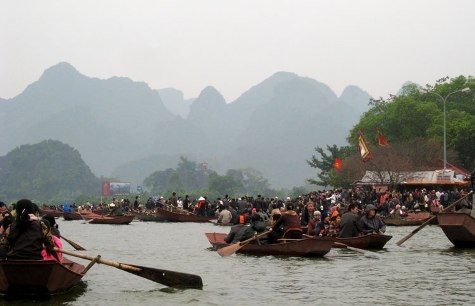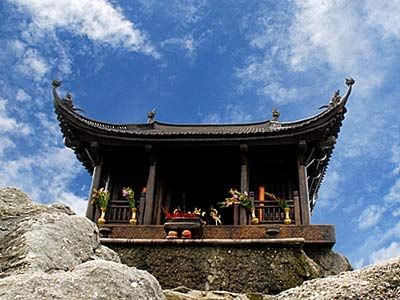A: Welcome to VOV’s Letter Box. This feature airs every Wednesday. Each week when we receive letters and emails from listeners around the world, we find that some of the listeners care about political issues in Vietnam while a majority are keenly interested in Vietnamese cultural, historical, and social issues. Dewan Rafiqul Islam, also known as Rana, President of the Friends’ Radio Club in Naogaon, Bangladesh, is a regular listener.
B: Whenever he sends us letters or emails his questions are always about history or culture. In his February 24th email he wrote ‘I’m not really interested in the news, but really enjoy cultural and historical programs.’
A: For Rana, today we’ll introduce the 3 most famous festivals in Vietnam. The first lunar month following the traditional Tet holiday is the time of festivals in Vietnam. Vietnamese people often spend this month going to pagodas and temples to pray for good luck and health and attend festivals there, too.
B: Every year, when the spring comes, thousands of people from all over Vietnam come to Hanoi for the Perfume Pagoda Festival, one of the country’s most elaborate festivals. Traditionally it’s held from the sixth day of the first lunar month to the end of the third lunar month. Vietnamese people believe that a pilgrimage to the Perfume Pagoda will bring health, prosperity, good luck and happiness, especially if you go there in three consecutive years.
A: The Perfume Pagoda is a vast complex of Buddhist temples and shrines built in the Huong Tich limestone mountains in My Duc district’s Huong Son commune, about 60km from central Hanoi. It usually takes travelers 2 hours of driving just to get to the Ben Duc pier. Though the pagoda complex can be reached by road from the pier, taking a row boat across the Yen river is a more popular option because of the breathtaking views that unfold during the 45-minute boat ride.
 |
| Taking row boat across the Yen river is a more popular option (Photo: opentour.vn) |
B: The Perfume Pagoda Festival combines an appreciation of nature and devotion to Buddha. In fact, the Festival is going to be submitted to UNESCO for recognition as a world cultural heritage site.
A: The Yen Tu Festival is the second largest festival in Vietnam, where a majority of people are Buddhists. It runs from the 10th day of the first lunar month until the end of the third lunar month in the town of Uong Bi, Quang Ninh province. Thousands of pilgrims begin their journey after a solemn ritual held at the base of Yen Tu Mountain. After a three-hour trek along a winding path through forests of pine or bamboo, pilgrims reach the Bronze Pagoda atop the mountain at more than 1,000 meters. It’s like entering Nirvana and standing by Heaven’s Gate shrouded in white clouds.
B: The Yen Tu complex features many pagodas, shrines or stupas now appearing now disappearing under the thick foliage. Many come to Yen Tu primarily to enjoy the pure mountain air and discover the beauty and mystery of this famous tourist attraction.
 |
| Bronze Pagoda in Yen Tu Mountain |
A: Although visitors can now take a car route to the top of Yen Tu Mountain, many prefer to walk all the way to the Bronze Pagoda. The awe-inspiring scenery surrounding the ancient pagodas and hermitages is said to have inspired King Tran Nhan Tong to pass the throne to his son so he could devote his life to living as a Buddhist monk at Yen Tu Mountain. There he founded the Truc Lam Zen Buddhist sect, which led to Yen Tu being recognized as the country’s leading centre for Buddhism. The highlight of this year’s festival was the recognition of Yen Tu as a Special National Relic in January.
B: The annual Yen Tu Spring Festival includes a wide variety of religious activities, including drums, bells and a ceremony to burn incense and pray for peace and prosperity.
Insert a song: Phu Van - Yen Tu
A: You’re listening to VOV’s Letter Box, broadcast every Wednesday. The song you just heard was about Yen Tu Mountain. The song is an example of Ca tru or ceremonial singing, believed to be a path for the Vietnamese soul.
B: The Hung Kings’ Temple Festival is another important one of Vietnam’s festivals. Celebrated on 10th day of the third lunar month each year, the festival has become one of Vietnam’s biggest national festivals. The 10th day of the third lunar month is the death anniversary of the country’s founders – the Hung Kings.
A: The Hung King’s Temple festival connects Vietnamese people from all over the country. It promotes the national unity and reminds Vietnamese people of their origin and history.
B: On festival day, people from all over the country head for Nghia Linh Mountain, where the Temple stands, to commemorate the Hung Kings, who established the country of Van Lang. The main festival day is the 10th, but visitors begin arriving at the temple as early as the 8th.
A: The festival has two main parts: an incense-offering ceremony and recreational activities. The ceremony is held at the Upper Temple to represent the gratitude and respect of the “Dragon and Fairy descendants” to their ancestors. The incense is offered by state officials and elders to the accompaniment of a bronze drum. The second part of the festival includes traditional and modern activities, notably a Xoan singing performance in the Upper temple and a Ca Tru singing performance in the Lower temple. Other interesting activities are cross-bow shooting, rice cooking, cock fighting, and dragon dancing.
B: Every week we salute regular listeners like Faisal Ahmed, President of the Digdarshan Radio Club of Bangladesh, Jack Wachtershauser of Western Australia, Khokan Naskar of Kolkata, India, and Toshiya Nishimura of Hinode Fukui-shi Fukui, Japan. They’re just a few of the listeners who sent us postal or electronic mail.
A: All these listeners sent reports of the English programs they heard and comments about technical issues and program contents. We greatly appreciate this feedback. Dear listeners, your reception reports were all complete enough for us to send you letters of confirmation. If your name wasn’t mentioned this week, don’t feel left out. We’ll try to acknowledge you next time.
B: That’s it for today’s Letter Box. Please keep in touch. We look forward to receiving your comments and suggestions. Our contact address is:
The English program,
Overseas Service, Radio Voice of Vietnam,
45 Ba Trieu Street, Hanoi, Vietnam
B: Or you can email us at: englishsection@vov.org.vn. If you miss any of our programs, you can always catch up by logging onto our website at: www.vovworld.vn, where you can hear both live broadcasts and previously recorded programs.
Bao Tram